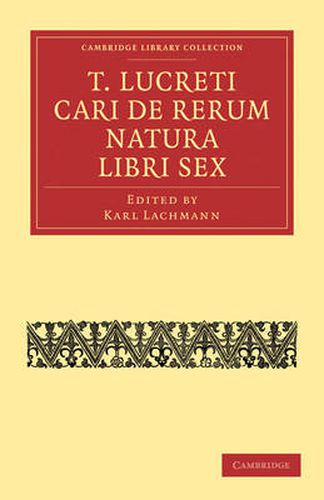Readings Newsletter
Become a Readings Member to make your shopping experience even easier.
Sign in or sign up for free!
You’re not far away from qualifying for FREE standard shipping within Australia
You’ve qualified for FREE standard shipping within Australia
The cart is loading…






Lucretius’ didactic poem On the Nature of Things is one of the great works of Latin literature, and Lachmann’s edition of the work from 1850 is often considered the beginning of modern textual criticism. The poem is divided into six books and leans heavily on Epicurean philosophy. All that exists in the world, even the soul, is composed of atoms that unite and dissipate with time; Lucretius does not believe in an afterlife or in any of the Roman gods. Lachmann defines the editorial principle that agreement in error implies identity of origin, and on this basis he creates a stemma for the manuscripts of Lucretius, and demonstrates how the three main manuscripts all derive from one archetype. His commentary is divided into two parts: the recensio (creation of a family tree for the manuscripts of the work) and a lengthy emendatio (correction of the errors in the text).
$9.00 standard shipping within Australia
FREE standard shipping within Australia for orders over $100.00
Express & International shipping calculated at checkout
Lucretius’ didactic poem On the Nature of Things is one of the great works of Latin literature, and Lachmann’s edition of the work from 1850 is often considered the beginning of modern textual criticism. The poem is divided into six books and leans heavily on Epicurean philosophy. All that exists in the world, even the soul, is composed of atoms that unite and dissipate with time; Lucretius does not believe in an afterlife or in any of the Roman gods. Lachmann defines the editorial principle that agreement in error implies identity of origin, and on this basis he creates a stemma for the manuscripts of Lucretius, and demonstrates how the three main manuscripts all derive from one archetype. His commentary is divided into two parts: the recensio (creation of a family tree for the manuscripts of the work) and a lengthy emendatio (correction of the errors in the text).